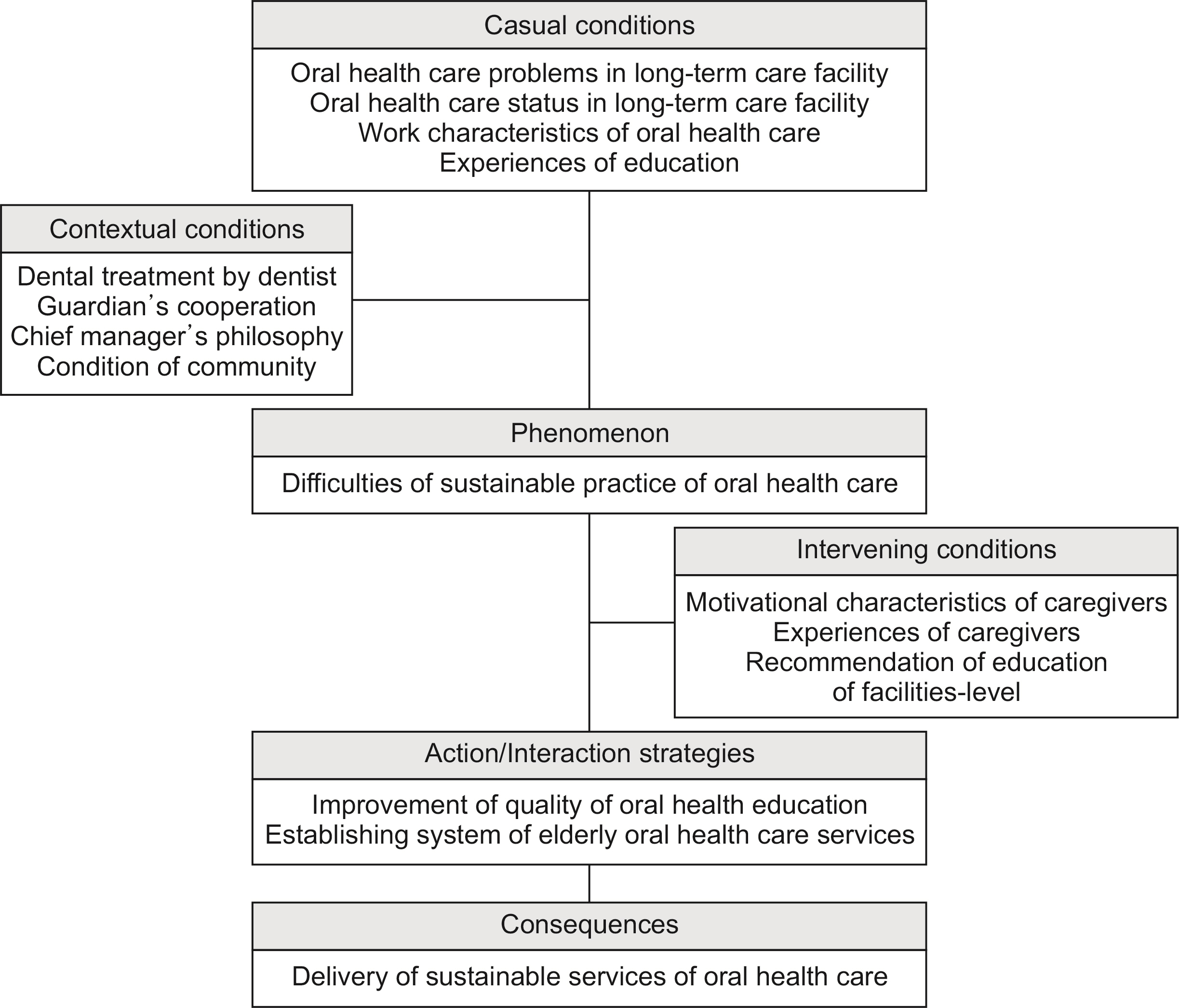J Korean Acad Oral Health.
2022 Dec;46(4):228-235. 10.11149/jkaoh.2022.46.4.228.
Exploration of the experience of caregivers for oral health care for the elderly in long-term care facilities: based on the grounded theory
- Affiliations
-
- 1Department of Preventive and Public Health Dentistry, School of Dentistry, Seoul National University, Seoul, Korea
- 2Dental Research Institute, Seoul National University, Seoul, Korea
- KMID: 2537819
- DOI: http://doi.org/10.11149/jkaoh.2022.46.4.228
Abstract
Objectives
This study aims to explore the experience of caregivers in oral health care of the elderly in long-term care facilities, identify the problems, and collect opinions, and to seek improvement directions for strengthening competency and improving services of oral health care for the elderly.
Methods
Data on the experience in oral health care of the elderly were collected through focus group interviews (FGI) targeting caregivers in long-term care facilities. The grounded theory method was used. The interview content was categorized by open coding, and a paradigm model was presented by identifying the relationship between the categories through axial coding. Selective coding found core categories.
Results
As a result of categorizing the caregivers’ oral care experience of the elderly, 15 categories, 40 sub-categories, and 125 concept/phenomena codes were derived. The central phenomenon was the difficulty of implementing sustainable oral health care. The deterioration of the mental and physical functions of the elderly, the work characteristics of caregivers, and the lack of linkage with internal and external resources of the facility acted as causal conditions for the central phenomenon. The caregiver’s oral health education experience acted as an intervening condition. In an effort to improve the problem, an interaction strategy was derived.
Conclusions
It is possible to seek delivery of sustainable oral health care services by caregivers by improving the quality of oral health education and establishing an oral health care service system for the elderly.
Keyword
Figure
Reference
-
References
1. Statistics Korea. 2022 Senior citizen statistics. [Internet]. Available from: https://www.kostat.go.kr/portal/korea/kor_nw/1/1/index.board?bmode=read&aSeq=420896. cited 2022 Dec 01.2. National Health Insurance Service. 2022. 2021 Long term care insurance statistical yearbook. National Health Insurance Service;Wonju: p. xliv–liv.3. Statistics Korea. Korea statistical information system (KOSIS), Statistics DB, Elderly welfare facility status, 2021. Number of welfare facilities for the elderly and living status [Internet]. Available from: https://kosis.kr/statHtml/statHtml.do?orgId=117&tblId=DT_117N_B00003&conn_path=I2. cited 2022 Dec 01.4. Park MS. 2010; Educational needs in the provision of oral care by nursing staff in long-term care facility for elderly people. J Korean Gerontol Nurs. 12:72–80.5. Han DH, Kim NH, Ko SM, Kwak JM, So JS, Lee SK, et al. 2015; Oral health status of institutionalized elderly in Korea. J Korean Dent Assoc. 53:688–695.6. Yang SB, Moon HS, Han DH, Lee HY, Chung MK. 2008; Oral health status and treatment need of institutionalized elderly patients. J Korean Acad Prosthodont. 46:455–469. DOI: 10.4047/jkap.2008.46.5.455.7. Korea Disease Control and Prevention Agency. 2022. Korea health statistics 2020: Korea national health and nutrition examination survey (KNHANES VIII-2). Korea Disease Control and Prevention Agency;Cheongju:8. Tsukada S, Ito K, Stegaroiu R, Shibata S, Ohuchi A. 2017; An oral health and function screening tool for nursing personnel of long-term care facilities to identify the need for dentist referral without preliminary training. Gerodontology. 34:232–239. DOI: 10.1111/ger.12255. PMID: 28066920.9. Watt RG, Daly B, Allison P, Macpherson LMD, Venturelli R, Listl S, et al. 2019; Ending the neglect of global oral health: time for radical action. Lancet. 394:261–272. DOI: 10.1016/S0140-6736(19)31133-X. PMID: 31327370.10. Seoul National University. 2020. Evaluation of oral health care status and development of oral health care assessment tools and guidelines: based on the caregivers at elderly care facilities. Ministry of Health and Welfare;Sejong: p. 41–60.11. Yoo KY. 2022. A Systematic approach to grounded theory methods: a guide to paper writing. Park Young Story;Seoul:12. Strauss A, Corbin J. 1998. Basics of qualitative research: techniques and procedures for developing grounded theory. Sage Publications;Thousand Oaks:13. Ryu JI, Park HA, Lee SJ, Jeon JE. 2021; A qualitative study on the evaluation of the registered dentists' program of dentists. J Korean Acad Oral Health. 45:64–70. DOI: 10.11149/jkaoh.2021.45.2.64.14. Yang BI, Park JA, Lee JY, Jin BH. 2021; A study on the influencing factors of oral health-related behaviors of the elderly in elderly welfare facilities on oral health-related quality of life. J Korean Acad Oral Health. 45:3–9. DOI: 10.11149/jkaoh.2021.45.1.3.15. Park JA, Han S, Lee YY, Jin BH. 2022; Competency of oral health management for the elderly of visiting health workers in the community and the effect of group oral health education. J Korean Acad Oral Health. 46 Suppl 1:204–207. DOI: 10.11149/jkaoh.2022.46.4.228.
- Full Text Links
- Actions
-
Cited
- CITED
-
- Close
- Share
- Similar articles
-
- The Experience to Implement Palliative Care in Long-term Care Facilities: A Grounded Theory Study of Caregivers
- A suggestion of the new oral health care system for the caregivers at the long-term care facilities
- Geriatric Long-Term Care Practice in Korea
- Long-Term Care Facility Caregivers’ Need to Reduce Physical Burdens
- Case study of a long-term care resident with oral health problem


